Unit 3 Could you please tell me where the restrooms are Section B2 (2a-2d) 优学案(含答案)
文档属性
| 名称 | Unit 3 Could you please tell me where the restrooms are Section B2 (2a-2d) 优学案(含答案) |
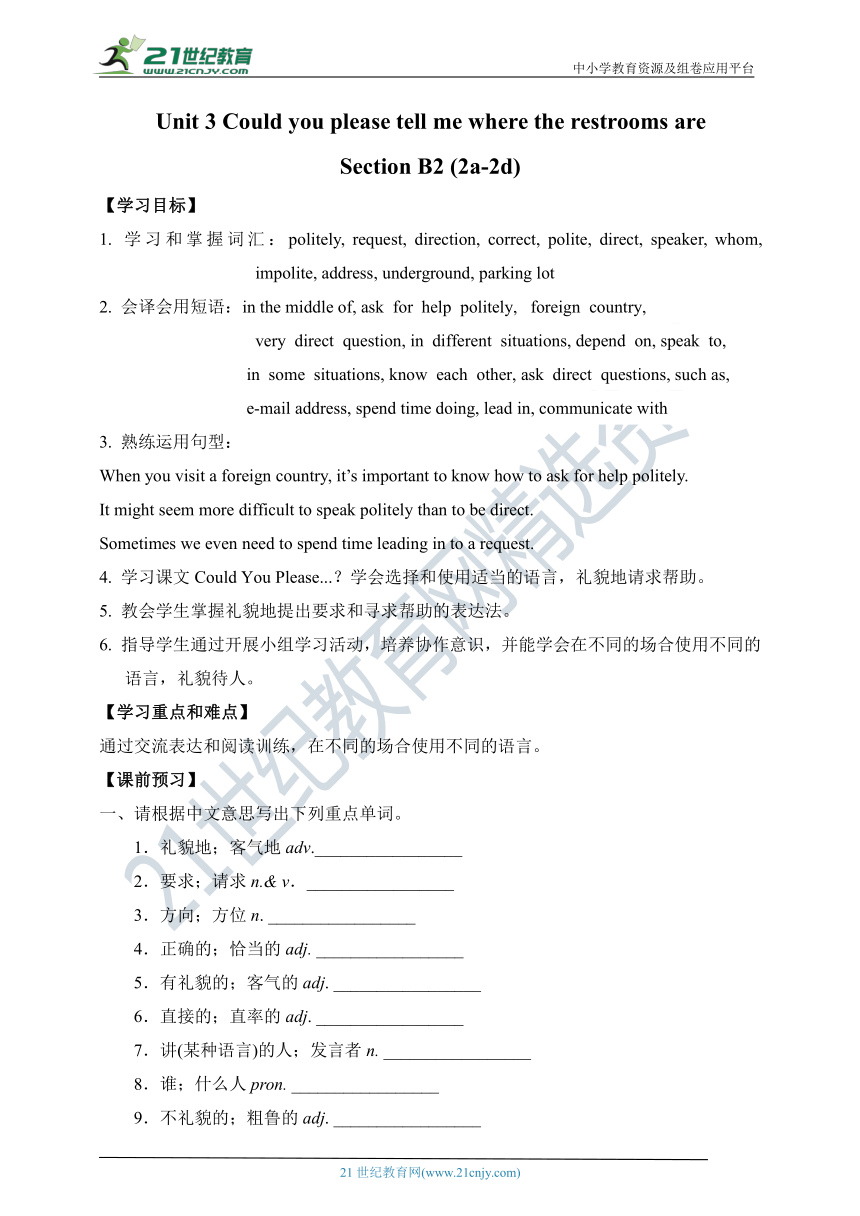
|
|
| 格式 | zip | ||
| 文件大小 | 1.1MB | ||
| 资源类型 | 试卷 | ||
| 版本资源 | 人教新目标(Go for it)版 | ||
| 科目 | 英语 | ||
| 更新时间 | 2019-08-12 15:21:09 | ||
图片预览

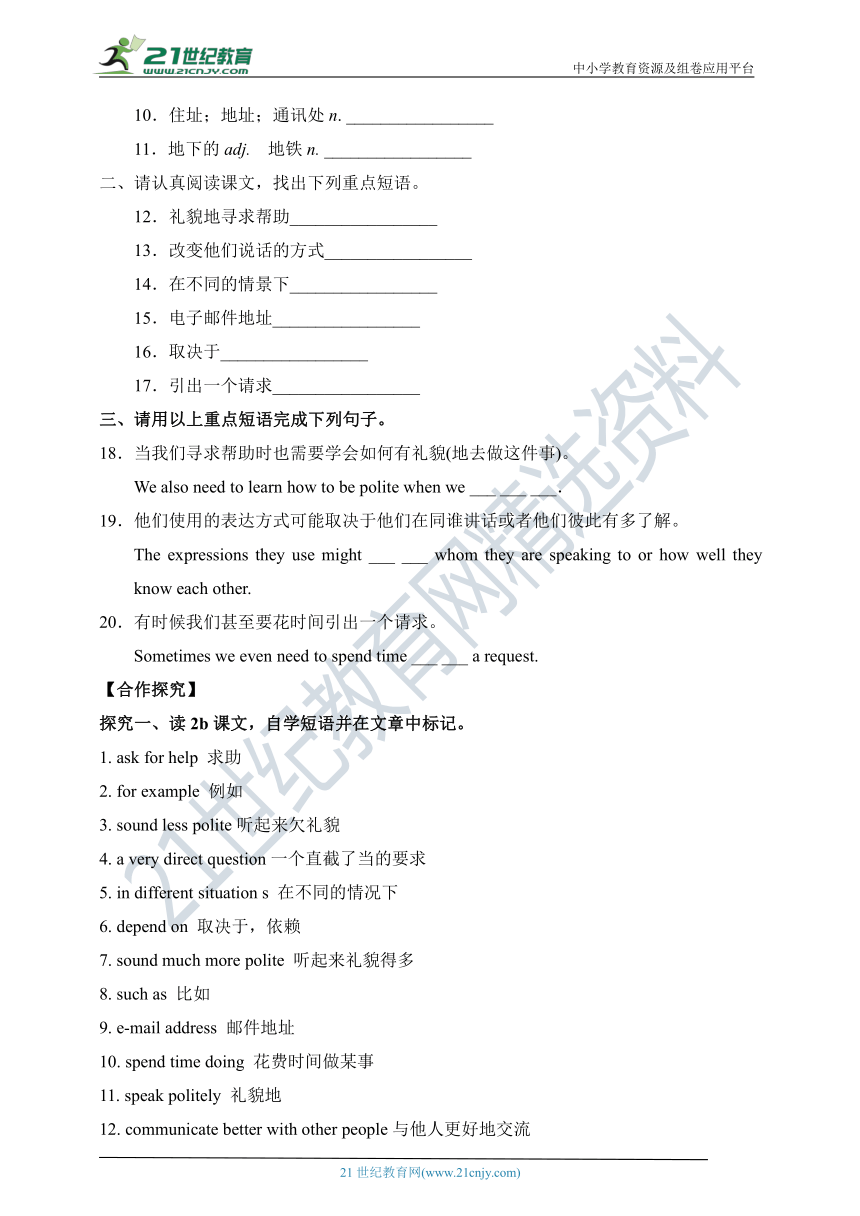
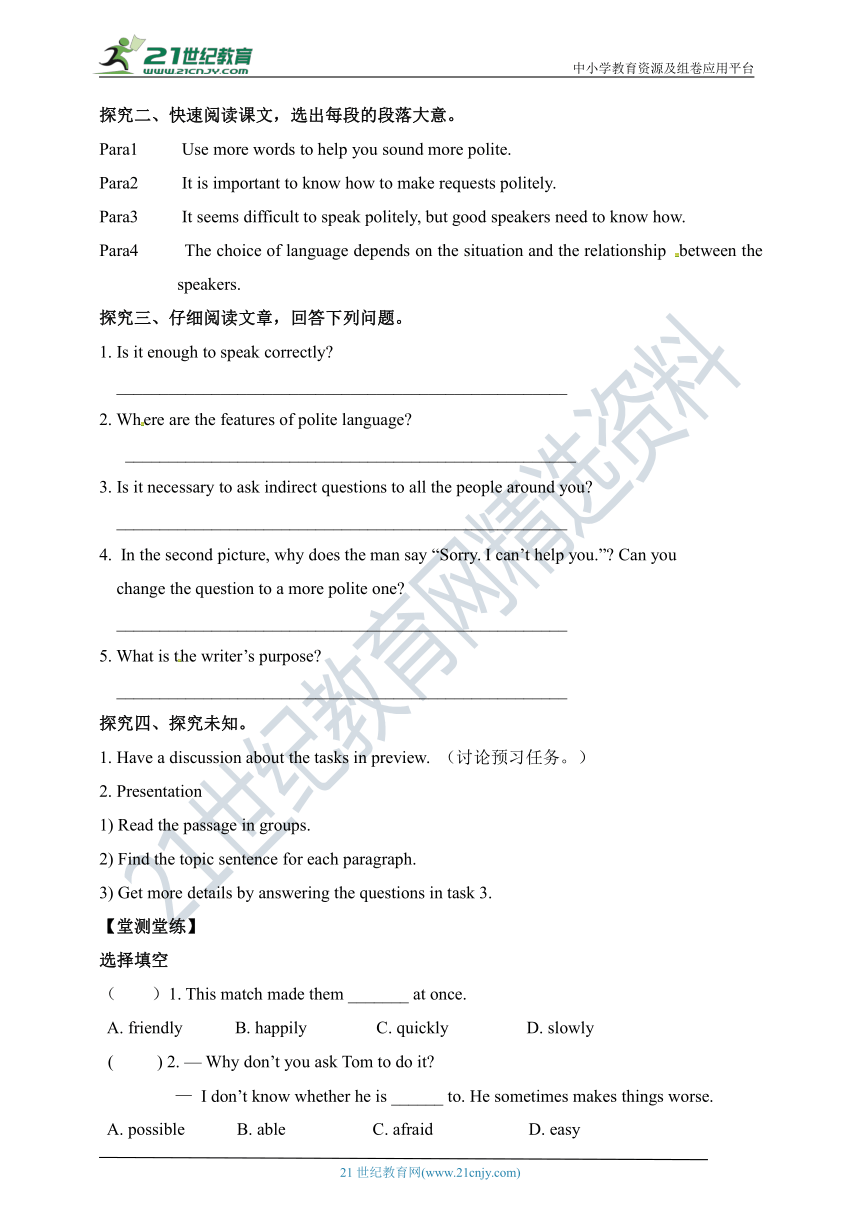
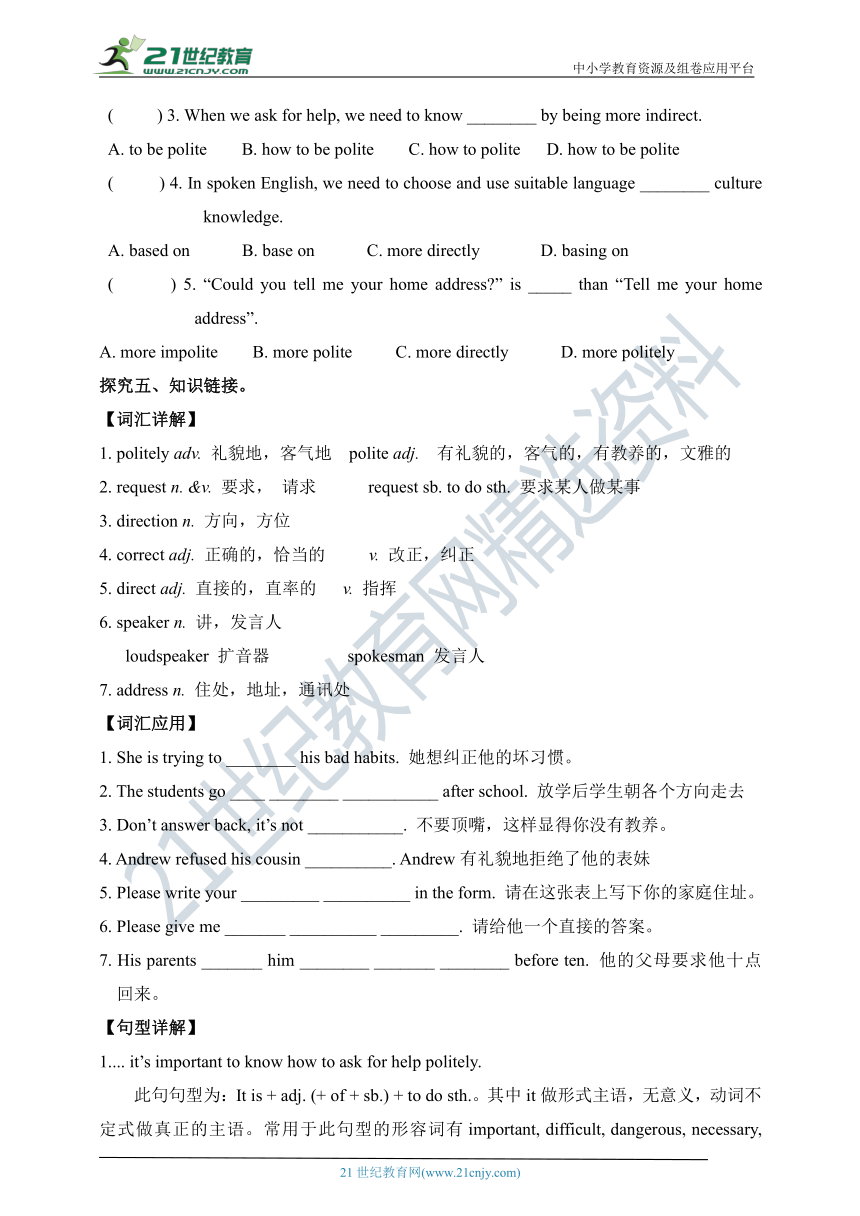
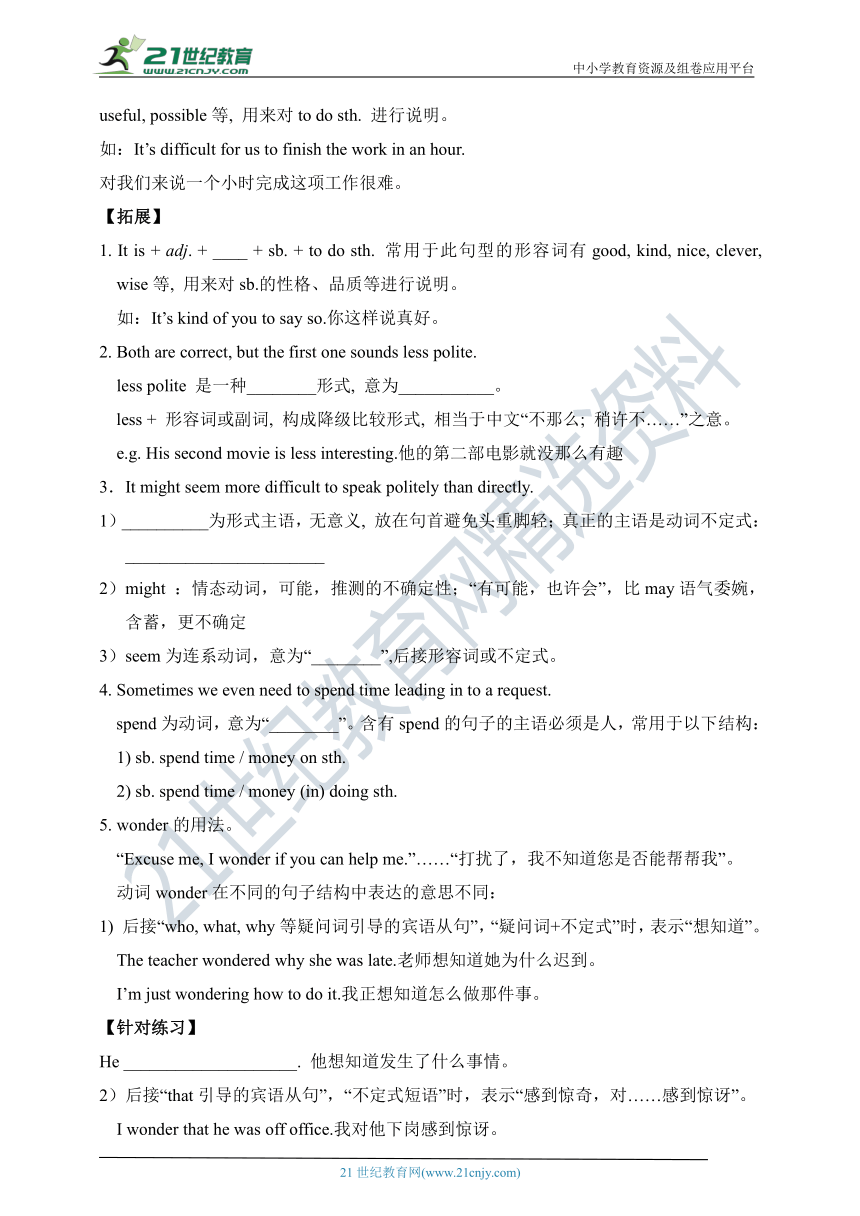
文档简介
Unit 3 Could you please tell me where the restrooms are
Section B2 (2a-2d)
【学习目标】
1. 学习和掌握词汇:politely, request, direction, correct, polite, direct, speaker, whom, impolite, address, underground, parking lot
2. 会译会用短语:in the middle of, ask?for?help?politely, ?foreign?country, ?very?direct?question, in?different?situations, depend?on, speak?to, in?some?situations, know?each?other, ask?direct?questions, such as, e-mail address, spend time doing, lead in, communicate with
3. 熟练运用句型:
When you visit a foreign country, it’s important to know how to ask for help politely.
It might seem more difficult to speak politely than to be direct.
Sometimes we even need to spend time leading in to a request.
4. 学习课文Could You Please...?学会选择和使用适当的语言,礼貌地请求帮助。
5. 教会学生掌握礼貌地提出要求和寻求帮助的表达法。
6. 指导学生通过开展小组学习活动,培养协作意识,并能学会在不同的场合使用不同的语言,礼貌待人。
【学习重点和难点】
通过交流表达和阅读训练,在不同的场合使用不同的语言。
【课前预习】
一、请根据中文意思写出下列重点单词。
1.礼貌地;客气地adv._________________
2.要求;请求n.& v._________________
3.方向;方位n. _________________
4.正确的;恰当的adj. _________________
5.有礼貌的;客气的adj. _________________
6.直接的;直率的adj. _________________
7.讲(某种语言)的人;发言者n. _________________
8.谁;什么人pron. _________________
9.不礼貌的;粗鲁的adj. _________________
10.住址;地址;通讯处n. _________________
11.地下的adj. 地铁n. _________________
二、请认真阅读课文,找出下列重点短语。
12.礼貌地寻求帮助_________________
13.改变他们说话的方式_________________
14.在不同的情景下_________________
15.电子邮件地址_________________
16.取决于_________________
17.引出一个请求_________________
三、请用以上重点短语完成下列句子。
18.当我们寻求帮助时也需要学会如何有礼貌(地去做这件事)。
We also need to learn how to be polite when we ___ ___ ___.
19.他们使用的表达方式可能取决于他们在同谁讲话或者他们彼此有多了解。
The expressions they use might ___ ___ whom they are speaking to or how well they know each other.
20.有时候我们甚至要花时间引出一个请求。
Sometimes we even need to spend time ___ ___ a request.
【合作探究】
探究一、读2b课文,自学短语并在文章中标记。
1. ask for help 求助
2. for example 例如
3. sound less polite听起来欠礼貌
4. a very direct question一个直截了当的要求
5. in different situation s 在不同的情况下
6. depend on 取决于,依赖
7. sound much more polite 听起来礼貌得多
8. such as 比如
9. e-mail address 邮件地址
10. spend time doing 花费时间做某事
11. speak politely 礼貌地
12. communicate better with other people与他人更好地交流
探究二、快速阅读课文,选出每段的段落大意。
Para1 Use more words to help you sound more polite.
Para2 It is important to know how to make requests politely.
Para3 It seems difficult to speak politely, but good speakers need to know how.
Para4 The choice of language depends on the situation and the relationship between the speakers.
探究三、仔细阅读文章,回答下列问题。
1. Is it enough to speak correctly?
____________________________________________________
2. Where are the features of polite language?
____________________________________________________
3. Is it necessary to ask indirect questions to all the people around you?
____________________________________________________
In the second picture, why does the man say “Sorry. I can’t help you.”? Can you
change the question to a more polite one?
____________________________________________________
5. What is the writer’s purpose?
____________________________________________________
探究四、探究未知。
1. Have a discussion about the tasks in preview. (讨论预习任务。)
2. Presentation
1) Read the passage in groups.
2) Find the topic sentence for each paragraph.
3) Get more details by answering the questions in task 3.
【堂测堂练】
选择填空
( )1. This match made them _______ at once.
A. friendly B. happily C. quickly D. slowly
( ) 2. — Why don’t you ask Tom to do it?
I don’t know whether he is ______ to. He sometimes makes things worse.
A. possible B. able C. afraid D. easy
( ) 3. When we ask for help, we need to know ________ by being more indirect.
A. to be polite B. how to be polite C. how to polite D. how to be polite
( ) 4. In spoken English, we need to choose and use suitable language ________ culture knowledge.
A. based on B. base on C. more directly D. basing on
( ) 5. “Could you tell me your home address?” is _____ than “Tell me your home address”.
A. more impolite B. more polite C. more directly D. more politely
探究五、知识链接。
【词汇详解】
1. politely adv. 礼貌地,客气地 polite adj. 有礼貌的,客气的,有教养的,文雅的
2. request n. &v. 要求, 请求 request sb. to do sth. 要求某人做某事
3. direction n. 方向,方位
4. correct adj. 正确的,恰当的 v. 改正,纠正
5. direct adj. 直接的,直率的 v. 指挥
6. speaker n. 讲,发言人
loudspeaker 扩音器 spokesman 发言人
7. address n. 住处,地址,通讯处
【词汇应用】
1. She is trying to ________ his bad habits. 她想纠正他的坏习惯。
2. The students go ____ ________ ___________ after school. 放学后学生朝各个方向走去
3. Don’t answer back, it’s not ___________. 不要顶嘴,这样显得你没有教养。
4. Andrew refused his cousin __________. Andrew有礼貌地拒绝了他的表妹
5. Please write your _________ __________ in the form. 请在这张表上写下你的家庭住址。
6. Please give me _______ __________ _________. 请给他一个直接的答案。
7. His parents _______ him ________ _______ ________ before ten. 他的父母要求他十点回来。
【句型详解】
1.... it’s important to know how to ask for help politely.
此句句型为:It is + adj. (+ of + sb.) + to do sth.。其中it做形式主语,无意义,动词不定式做真正的主语。常用于此句型的形容词有important, difficult, dangerous, necessary, useful, possible等, 用来对to do sth. 进行说明。
如:It’s difficult for us to finish the work in an hour.
对我们来说一个小时完成这项工作很难。
【拓展】
1. It is + adj. + ____ + sb. + to do sth. 常用于此句型的形容词有good, kind, nice, clever, wise等, 用来对sb.的性格、品质等进行说明。
如:It’s kind of you to say so.你这样说真好。
2. Both are correct, but the first one sounds less polite.
less polite 是一种________形式, 意为___________。
less + 形容词或副词, 构成降级比较形式, 相当于中文“不那么; 稍许不……”之意。
e.g. His second movie is less interesting.他的第二部电影就没那么有趣
3.It might seem more difficult to speak politely than directly.
1)__________为形式主语,无意义, 放在句首避免头重脚轻;真正的主语是动词不定式:_______________________
2)might :情态动词,可能,推测的不确定性;“有可能,也许会”,比may语气委婉,含蓄,更不确定
3)seem为连系动词,意为“________”,后接形容词或不定式。
4. Sometimes we even need to spend time leading in to a request.
spend为动词,意为“________”。含有spend的句子的主语必须是人,常用于以下结构:
1) sb. spend time / money on sth.
2) sb. spend time / money (in) doing sth.
5. wonder的用法。
“Excuse me, I wonder if you can help me.”……“打扰了,我不知道您是否能帮帮我”。
动词wonder在不同的句子结构中表达的意思不同:
1) 后接“who, what, why等疑问词引导的宾语从句”,“疑问词+不定式”时,表示“想知道”。
The teacher wondered why she was late.老师想知道她为什么迟到。
I’m just wondering how to do it.我正想知道怎么做那件事。
【针对练习】
He ____________________. 他想知道发生了什么事情。
2)后接“that引导的宾语从句”,“不定式短语”时,表示“感到惊奇,对……感到惊讶”。
I wonder that he was off office.我对他下岗感到惊讶。
I wonder to see her looking so cheerful. 我很惊讶地发现她如此高兴。
3)后接if或whether引导的宾语从句时,表示一种委婉的请求或疑问。
I wonder if you would mind giving me a hand.我不知道你是否能帮我一下。
【针对练习】
She wondered whether ____________. 她不知道那天上午你是否有空。
【课时小结】
重点单词
1. politely (adv.)礼貌地;客气地
2. request(n. &v.)要求;请求
3. direction (n.)方向;方位
4. correct(adj.)正确的;恰当的
5. polite(adj.)有礼貌的;客气地
6. direct(adj.)直接的;直率的
7. indirect (adj.) 间接的
8. speaker (n.) 讲(某种语言)的人;发言者
9. whom ( pron.) 谁;什么人
10. impolite(adj.) 不礼貌的;粗鲁的
11. address (n.)住址;地址;通讯处
12. underground (adj.) 地下的(n.)地铁
重点词组
1. ask for help politely礼貌地请求帮助
2. change the way they talk改变说话的方式
3. in different situations在不同的情景
4. e-mail address电子邮件地址
5. lead into a request导入一个问题
重点句式
1. We also need to learn how to be polite by being less direct-or more indirect-when we ask for help.当我们寻求帮助时我们也需要学会如何通过不是很直接或是更为间接的方式变得有礼貌。
2. The expressions they use might depend on whom they are speaking to or how well they know each other.他们使用的表达方式可能取决于他们同谁在讲话或者他们彼此有多了解。
3. It might seem more difficult to speak politely than to be direct.礼貌地讲话似乎比直截了当更困难。
4. However,it is important to learn how to use proper language.然而学会如何使用恰当的语言很重要。
5.—Pardon me,could you please tell me where to park my car?对不起,能请你告诉我在哪停车吗?
—Sure.There’s an underground parking lot over there.当然可以,那边有个地下停车场。
【达标检测】
一、根据句意及首字母提示完成单词。
1. I think it is important to know how to ask for help p_________.
2. Be sure to write the name and a________ correctly in your e-mail.
3. I'm a stranger here and I don’t know the d________ to the old temple.
4. Most of the big supermarkets have their own u________ parking lots because there are not enough places for so many cars on the ground.
5. Sorry, your answer to the question isn’t c________. It’s wrong.
二、用括号内所给单词的适当形式填空。 1. I spend three hours _______(finish) the work.
2. The little girl is very kind and she always talks to people ________ (polite).
3. Work hard and you will find the way to the questions ________ (correct).
4. I’m sorry ________ (trouble) you. But can you direct me to the nearest bus stop.
5. Good ________ (speak) can change the way they speak in different situations.
三、选择填空。
( )1. “Excuse me, could you tell me the way _____ the park?”. He asked the policeman.
A. of B. to C. from D. in
( )2. The teacher always uses a story or a game to ______his new lesson.
A. lead in B. leading C. lead into D. leading into
( )3. —Grandma is very healthy, isn’t she?
—Yes. That’s ______ she often does exercise.
A. why B. because C. what D. where
( )4. —Excuse me, could you tell me ____the man over there is?
—I’m not sure. Maybe he is between 30 and 35.
A. how much B. how old C. how many D. how long
( )5. It’s impolite __________ information directly when asking for help.
A. ask B. asking C. asked D. to ask
四、补全对话。
A: Excuse me! Could you tell me where there is a good place to eat?
B: 1 ___________! There are many good restaurants here. What food do you like to eat?
A: I like Chinese food. So do you know where there are any Chinese restaurants?
B: Yes. We have two. One is on the Mai Street, named Sunlight. 2 __________, called Yuan’s.
A: 3 ___________?
B: Yuan’s is a little nearer but it’s expensive.
A: What about Sunlight?
B: Sunlight is farther but the food is both delicious and cheap.5
A: That’s great. But 4 __________?
B: Go down the street and turn left at the second crossing. Then you will be on the Main Street. You’ll see Sunlight between the cloth shop and the café.
A: 5 _______________!
参考答案
【课前预习】
1. politely 2. request 3. direction 4. correct 5. polite
6. direct 7. speaker 8. whom 9. impolite 10. address 11. underground 12. ask for help politely 13. change the way they speak
14. in different situations 15. e-mail address 16. depend on
17. lead into a request 18. ask for help 19. depend on
20 leading into
【合作探究】
探究二
Para1 It is important to know how to make requests politely.
Para2 The choice of language depends on the situation and the relationship
between the speakers.
Para3 Use more words to help you sound more polite.
Para4 It seems difficult to speak politely, but good speakers need to know how.
探究三
1. No, it isn’t. it is not enough to just ask a question correctly.
2. Polite language is longer.
3. No, it isn’t.
4. Because the boy is impolite.
Excuse me, can you tell me where is the post office?
5. To help you communicate better with other people.
探究四 1-5 ABBAD
探究五
【词汇应用】
1. correct 2. in all directions 3. polite
4. politely 5. address down 6.a direct answer
7. request; to come back
【句型详解】
1. of
2. 否定;不太礼貌
3. 1) it;to speak politely than directly. 3) 似乎
4. 花费
5. 1) wondered what had happened 2) you were free that morning
【课堂检测】
一、 1. politely 2. address 3.direction 4.underground 5.correct
二、 1. finishing 2.politely 3.correctly 4. to trouble 5.speakers
三、1-5 BCBBD
四、FGCAE
Section B2 (2a-2d)
【学习目标】
1. 学习和掌握词汇:politely, request, direction, correct, polite, direct, speaker, whom, impolite, address, underground, parking lot
2. 会译会用短语:in the middle of, ask?for?help?politely, ?foreign?country, ?very?direct?question, in?different?situations, depend?on, speak?to, in?some?situations, know?each?other, ask?direct?questions, such as, e-mail address, spend time doing, lead in, communicate with
3. 熟练运用句型:
When you visit a foreign country, it’s important to know how to ask for help politely.
It might seem more difficult to speak politely than to be direct.
Sometimes we even need to spend time leading in to a request.
4. 学习课文Could You Please...?学会选择和使用适当的语言,礼貌地请求帮助。
5. 教会学生掌握礼貌地提出要求和寻求帮助的表达法。
6. 指导学生通过开展小组学习活动,培养协作意识,并能学会在不同的场合使用不同的语言,礼貌待人。
【学习重点和难点】
通过交流表达和阅读训练,在不同的场合使用不同的语言。
【课前预习】
一、请根据中文意思写出下列重点单词。
1.礼貌地;客气地adv._________________
2.要求;请求n.& v._________________
3.方向;方位n. _________________
4.正确的;恰当的adj. _________________
5.有礼貌的;客气的adj. _________________
6.直接的;直率的adj. _________________
7.讲(某种语言)的人;发言者n. _________________
8.谁;什么人pron. _________________
9.不礼貌的;粗鲁的adj. _________________
10.住址;地址;通讯处n. _________________
11.地下的adj. 地铁n. _________________
二、请认真阅读课文,找出下列重点短语。
12.礼貌地寻求帮助_________________
13.改变他们说话的方式_________________
14.在不同的情景下_________________
15.电子邮件地址_________________
16.取决于_________________
17.引出一个请求_________________
三、请用以上重点短语完成下列句子。
18.当我们寻求帮助时也需要学会如何有礼貌(地去做这件事)。
We also need to learn how to be polite when we ___ ___ ___.
19.他们使用的表达方式可能取决于他们在同谁讲话或者他们彼此有多了解。
The expressions they use might ___ ___ whom they are speaking to or how well they know each other.
20.有时候我们甚至要花时间引出一个请求。
Sometimes we even need to spend time ___ ___ a request.
【合作探究】
探究一、读2b课文,自学短语并在文章中标记。
1. ask for help 求助
2. for example 例如
3. sound less polite听起来欠礼貌
4. a very direct question一个直截了当的要求
5. in different situation s 在不同的情况下
6. depend on 取决于,依赖
7. sound much more polite 听起来礼貌得多
8. such as 比如
9. e-mail address 邮件地址
10. spend time doing 花费时间做某事
11. speak politely 礼貌地
12. communicate better with other people与他人更好地交流
探究二、快速阅读课文,选出每段的段落大意。
Para1 Use more words to help you sound more polite.
Para2 It is important to know how to make requests politely.
Para3 It seems difficult to speak politely, but good speakers need to know how.
Para4 The choice of language depends on the situation and the relationship between the speakers.
探究三、仔细阅读文章,回答下列问题。
1. Is it enough to speak correctly?
____________________________________________________
2. Where are the features of polite language?
____________________________________________________
3. Is it necessary to ask indirect questions to all the people around you?
____________________________________________________
In the second picture, why does the man say “Sorry. I can’t help you.”? Can you
change the question to a more polite one?
____________________________________________________
5. What is the writer’s purpose?
____________________________________________________
探究四、探究未知。
1. Have a discussion about the tasks in preview. (讨论预习任务。)
2. Presentation
1) Read the passage in groups.
2) Find the topic sentence for each paragraph.
3) Get more details by answering the questions in task 3.
【堂测堂练】
选择填空
( )1. This match made them _______ at once.
A. friendly B. happily C. quickly D. slowly
( ) 2. — Why don’t you ask Tom to do it?
I don’t know whether he is ______ to. He sometimes makes things worse.
A. possible B. able C. afraid D. easy
( ) 3. When we ask for help, we need to know ________ by being more indirect.
A. to be polite B. how to be polite C. how to polite D. how to be polite
( ) 4. In spoken English, we need to choose and use suitable language ________ culture knowledge.
A. based on B. base on C. more directly D. basing on
( ) 5. “Could you tell me your home address?” is _____ than “Tell me your home address”.
A. more impolite B. more polite C. more directly D. more politely
探究五、知识链接。
【词汇详解】
1. politely adv. 礼貌地,客气地 polite adj. 有礼貌的,客气的,有教养的,文雅的
2. request n. &v. 要求, 请求 request sb. to do sth. 要求某人做某事
3. direction n. 方向,方位
4. correct adj. 正确的,恰当的 v. 改正,纠正
5. direct adj. 直接的,直率的 v. 指挥
6. speaker n. 讲,发言人
loudspeaker 扩音器 spokesman 发言人
7. address n. 住处,地址,通讯处
【词汇应用】
1. She is trying to ________ his bad habits. 她想纠正他的坏习惯。
2. The students go ____ ________ ___________ after school. 放学后学生朝各个方向走去
3. Don’t answer back, it’s not ___________. 不要顶嘴,这样显得你没有教养。
4. Andrew refused his cousin __________. Andrew有礼貌地拒绝了他的表妹
5. Please write your _________ __________ in the form. 请在这张表上写下你的家庭住址。
6. Please give me _______ __________ _________. 请给他一个直接的答案。
7. His parents _______ him ________ _______ ________ before ten. 他的父母要求他十点回来。
【句型详解】
1.... it’s important to know how to ask for help politely.
此句句型为:It is + adj. (+ of + sb.) + to do sth.。其中it做形式主语,无意义,动词不定式做真正的主语。常用于此句型的形容词有important, difficult, dangerous, necessary, useful, possible等, 用来对to do sth. 进行说明。
如:It’s difficult for us to finish the work in an hour.
对我们来说一个小时完成这项工作很难。
【拓展】
1. It is + adj. + ____ + sb. + to do sth. 常用于此句型的形容词有good, kind, nice, clever, wise等, 用来对sb.的性格、品质等进行说明。
如:It’s kind of you to say so.你这样说真好。
2. Both are correct, but the first one sounds less polite.
less polite 是一种________形式, 意为___________。
less + 形容词或副词, 构成降级比较形式, 相当于中文“不那么; 稍许不……”之意。
e.g. His second movie is less interesting.他的第二部电影就没那么有趣
3.It might seem more difficult to speak politely than directly.
1)__________为形式主语,无意义, 放在句首避免头重脚轻;真正的主语是动词不定式:_______________________
2)might :情态动词,可能,推测的不确定性;“有可能,也许会”,比may语气委婉,含蓄,更不确定
3)seem为连系动词,意为“________”,后接形容词或不定式。
4. Sometimes we even need to spend time leading in to a request.
spend为动词,意为“________”。含有spend的句子的主语必须是人,常用于以下结构:
1) sb. spend time / money on sth.
2) sb. spend time / money (in) doing sth.
5. wonder的用法。
“Excuse me, I wonder if you can help me.”……“打扰了,我不知道您是否能帮帮我”。
动词wonder在不同的句子结构中表达的意思不同:
1) 后接“who, what, why等疑问词引导的宾语从句”,“疑问词+不定式”时,表示“想知道”。
The teacher wondered why she was late.老师想知道她为什么迟到。
I’m just wondering how to do it.我正想知道怎么做那件事。
【针对练习】
He ____________________. 他想知道发生了什么事情。
2)后接“that引导的宾语从句”,“不定式短语”时,表示“感到惊奇,对……感到惊讶”。
I wonder that he was off office.我对他下岗感到惊讶。
I wonder to see her looking so cheerful. 我很惊讶地发现她如此高兴。
3)后接if或whether引导的宾语从句时,表示一种委婉的请求或疑问。
I wonder if you would mind giving me a hand.我不知道你是否能帮我一下。
【针对练习】
She wondered whether ____________. 她不知道那天上午你是否有空。
【课时小结】
重点单词
1. politely (adv.)礼貌地;客气地
2. request(n. &v.)要求;请求
3. direction (n.)方向;方位
4. correct(adj.)正确的;恰当的
5. polite(adj.)有礼貌的;客气地
6. direct(adj.)直接的;直率的
7. indirect (adj.) 间接的
8. speaker (n.) 讲(某种语言)的人;发言者
9. whom ( pron.) 谁;什么人
10. impolite(adj.) 不礼貌的;粗鲁的
11. address (n.)住址;地址;通讯处
12. underground (adj.) 地下的(n.)地铁
重点词组
1. ask for help politely礼貌地请求帮助
2. change the way they talk改变说话的方式
3. in different situations在不同的情景
4. e-mail address电子邮件地址
5. lead into a request导入一个问题
重点句式
1. We also need to learn how to be polite by being less direct-or more indirect-when we ask for help.当我们寻求帮助时我们也需要学会如何通过不是很直接或是更为间接的方式变得有礼貌。
2. The expressions they use might depend on whom they are speaking to or how well they know each other.他们使用的表达方式可能取决于他们同谁在讲话或者他们彼此有多了解。
3. It might seem more difficult to speak politely than to be direct.礼貌地讲话似乎比直截了当更困难。
4. However,it is important to learn how to use proper language.然而学会如何使用恰当的语言很重要。
5.—Pardon me,could you please tell me where to park my car?对不起,能请你告诉我在哪停车吗?
—Sure.There’s an underground parking lot over there.当然可以,那边有个地下停车场。
【达标检测】
一、根据句意及首字母提示完成单词。
1. I think it is important to know how to ask for help p_________.
2. Be sure to write the name and a________ correctly in your e-mail.
3. I'm a stranger here and I don’t know the d________ to the old temple.
4. Most of the big supermarkets have their own u________ parking lots because there are not enough places for so many cars on the ground.
5. Sorry, your answer to the question isn’t c________. It’s wrong.
二、用括号内所给单词的适当形式填空。 1. I spend three hours _______(finish) the work.
2. The little girl is very kind and she always talks to people ________ (polite).
3. Work hard and you will find the way to the questions ________ (correct).
4. I’m sorry ________ (trouble) you. But can you direct me to the nearest bus stop.
5. Good ________ (speak) can change the way they speak in different situations.
三、选择填空。
( )1. “Excuse me, could you tell me the way _____ the park?”. He asked the policeman.
A. of B. to C. from D. in
( )2. The teacher always uses a story or a game to ______his new lesson.
A. lead in B. leading C. lead into D. leading into
( )3. —Grandma is very healthy, isn’t she?
—Yes. That’s ______ she often does exercise.
A. why B. because C. what D. where
( )4. —Excuse me, could you tell me ____the man over there is?
—I’m not sure. Maybe he is between 30 and 35.
A. how much B. how old C. how many D. how long
( )5. It’s impolite __________ information directly when asking for help.
A. ask B. asking C. asked D. to ask
四、补全对话。
A: Excuse me! Could you tell me where there is a good place to eat?
B: 1 ___________! There are many good restaurants here. What food do you like to eat?
A: I like Chinese food. So do you know where there are any Chinese restaurants?
B: Yes. We have two. One is on the Mai Street, named Sunlight. 2 __________, called Yuan’s.
A: 3 ___________?
B: Yuan’s is a little nearer but it’s expensive.
A: What about Sunlight?
B: Sunlight is farther but the food is both delicious and cheap.5
A: That’s great. But 4 __________?
B: Go down the street and turn left at the second crossing. Then you will be on the Main Street. You’ll see Sunlight between the cloth shop and the café.
A: 5 _______________!
参考答案
【课前预习】
1. politely 2. request 3. direction 4. correct 5. polite
6. direct 7. speaker 8. whom 9. impolite 10. address 11. underground 12. ask for help politely 13. change the way they speak
14. in different situations 15. e-mail address 16. depend on
17. lead into a request 18. ask for help 19. depend on
20 leading into
【合作探究】
探究二
Para1 It is important to know how to make requests politely.
Para2 The choice of language depends on the situation and the relationship
between the speakers.
Para3 Use more words to help you sound more polite.
Para4 It seems difficult to speak politely, but good speakers need to know how.
探究三
1. No, it isn’t. it is not enough to just ask a question correctly.
2. Polite language is longer.
3. No, it isn’t.
4. Because the boy is impolite.
Excuse me, can you tell me where is the post office?
5. To help you communicate better with other people.
探究四 1-5 ABBAD
探究五
【词汇应用】
1. correct 2. in all directions 3. polite
4. politely 5. address down 6.a direct answer
7. request; to come back
【句型详解】
1. of
2. 否定;不太礼貌
3. 1) it;to speak politely than directly. 3) 似乎
4. 花费
5. 1) wondered what had happened 2) you were free that morning
【课堂检测】
一、 1. politely 2. address 3.direction 4.underground 5.correct
二、 1. finishing 2.politely 3.correctly 4. to trouble 5.speakers
三、1-5 BCBBD
四、FGCAE
同课章节目录
- Unit 1 How can we become good learners.
- Section A
- Section B
- Unit 2 I think that mooncakes are delicious!
- Section A
- Section B
- Unit 3 Could you please tell me where the restroom
- Section A
- Section B
- Unit 4 I used to be afraid of the dark.
- Section A
- Section B
- Unit 5 What are the shirts made of?
- Section A
- Section B
- Review of Units 1-5
- Unit 6 When was it invented?
- Section A
- Section B
- Unit 7 Teenagers should be allowed to choose their
- Section A
- Section B
- Unit 8 It must belong to Carla.
- Section A
- Section B
- Unit 9 I like music that I can dance to.
- Section A
- Section B
- Unit 10 You're supposed to shake hands.
- Section A
- Section B
- Review of Units 6-10
- Unit 11 Sad movies make me cry.
- Section A
- Section B
- Unit 12 Life is full of the unexpected
- Section A
- Section B
- Unit 13 We're trying to save the earth!
- Section A
- Section B
- Unit 14 I remember meeting all of you in Grade 7.
- Section A
- Section B
- Review of Units 11-14
